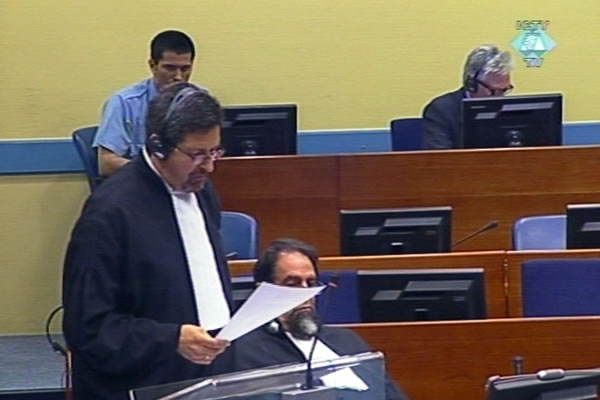Home
THE DIFFERENCE BETWEEN REALITY AND FICTION
Novak Lukic, General Momcilo Perisic’s defense counsel, contends in his closing argument that the direct perpetrators of the crimes in Sarajevo and Srebrenica were part of the VRS chain of command, not the VJ, as the prosecution alleges. Lukic corroborated his claim with Perisic’s quote. ‘Those officers are not here, they are serving where they actually are...’, Perisic said at a meeting of the Supreme Defense Council
 Novak Lukic, defense attorney of Momcilo Perisic
Novak Lukic, defense attorney of Momcilo Perisic Continuing the closing argument, Novak Lukic, the defense counsel representing the former chief of the VJ General Staff Momcilo Perisic, quoted from the minutes of the 14th session of the Supreme Defense Council. According to Lukic, the excerpt shows that the officers who committed the gravest crimes in Sarajevo and Srebrenica were part of the VRS chain of command, not the VJ, contrary to what the prosecution alleged.
At the meeting on 11 October 1993, General Perisic said, ‘Lest anyone could object, we invented a temporary establishment: those officers are not here [in the VJ], they are there, serving where they actually are’, in the VRS and the SVK. Fictitious establishments were formally confirmed a month later in the 30th and 40th Personnel Center of the VJ General Staff. The prosecution alleges that General Perisic provided personnel support to the Serb armies in Bosnia and Krajina through those two personnel centers.
The defense contends that most of those officers ‘served in the VRS initially and maintained that status during the entire war’. They ‘were part of a single chain of command’, the defense went on, where they had ‘ranks, posts, uniforms and superiors who issued orders to them’. On the other hand, the prosecution ‘wants to emphasize the importance of the moment when the personnel centers were established, neglecting’ some of the key evidence about the status of those officers at the time when the VRS was formed.
The defense counsel went a step further claiming that ‘none’ of the officers who committed crimes in Sarajevo and Srebrenica ‘were appointed to a post after August 1993, when Perisic was promoted the chief of the VJ General Staff’. The defense used Zdravko Tolimir and Vinko Pandurevic to make a distinction between ‘real’ orders appointing them to their posts, written in the VRS, and the ‘fictitious and inaccurate’ orders issued later in the 30th or 40th Personnel Center.
According to the defense, the fictitious orders specify accurately only the rank and the post of an officer because this was necessary to ‘regulate their entitlements’. Only that part of the orders was ever implemented and the orders did not have any other legal effect. Had this not been the case, then Ratko Mladic, as the commander of the VRS Main Staff, would have been subordinated to the Personnel Administration in the VJ General Staff, the defense counsel noted.
The defense counsel insisted on the importance of the ‘single chain of command’. All officers listed in the indictment as members of the 30th Personnel Center, and convicted before the Tribunal for crimes in Sarajevo and Srebrenica, ‘were never appointed to posts in the VJ and were not Perisic’s subordinates’, the defense claims. This is why Perisic couldn’t be found guilty of aiding and abetting the crimes perpetrated there, the defense noted.
Apart from subordination, the defense lawyer also noted there is a difference between ‘influence’ and ‘effective control’. According to the defense, Perisic did not have the latter. As for the duty to prevent crimes and punish the perpetrators, it exists only if one has effective control at the time when a crime is perpetrated. Since the VRS and the SVK officers, who were the direct perpetrators of crimes, were not a part of the VJ chain of command, Perisic did no have effective control over them, the defense counsel concluded.
The defense counsel then recalled the political context of the crimes Perisic is charged with. Although the prosecution claimed that the Serbian state policy remained constant at all times, this was not the case. The FRY state leadership showed a constant and sincere desire to see the war end, the defense claimed. The minutes from 25th and 28th session of the Supreme Defense Council support this claim: Slobodan Milosevic and Momcilo Perisic discuss how to ‘make the Bosnian Serbs see reason’ and accept peace. General Mladic was one of the key figures who rejected the Contact Group plan; he showed ‘absolutely no respect, and even less recognition of the authority of the FRY leadership’, the defense lawyer said.
The defense will complete its closing argument tomorrow and then the prosecution will have an opportunity to respond.
Linked Reports
- Case : Perisic
- 2011-03-29 PROSECUTOR SEEKS LIFE IN PRISON FOR GENERAL PERISIC
- 2011-03-28 PROSECUTION ON PERISIC: ‘SHADOW WARRIOR’
- 2011-03-25 ICTY LIFTS SEAL FROM SUPREME DEFENSE COUNCIL DOCUMENTS IN MOMCILO PERISIC CASE
- 2011-03-31 DEFENSE CALLS FOR GENERAL PERISIC’S ACQUITTAL
- 2011-05-16 ARMY THAT IS ‘SORT OF HERE, AND IN FACT IT IS THERE’
- 2011-05-17 BELGRADE’S CONTRIBUTION TO WAR IN BOSNIA AND HERZEGOVINA
